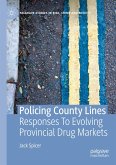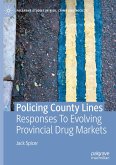This book presents an in-depth investigation into street gang involvement, desistance, and non-involvement through the lens of the Risk Factor Prevention Paradigm (RFPP). This framework encompasses five domains of risk and prevention: family, neighbourhood, peers, individual, and school. It identifies the risk and protective factors that influence young people to either engage in, desist or abstain from involvement in deviant street groups.
Based on a comprehensive five-and-a-half-year study, the author draws upon his lifelong experience living in Stockbridge Village, Merseyside, one of the most deprived areas in the UK marked by street gang activity and organised crime. The author's unique position allows him to establish a strong rapport with young, disenfranchised individuals involved in street gangs.
This book offers a comprehensive exploration of critical observations related to street gang involvement by integrating insights that provide a nuanced understanding of the sociocultural factors that both drive individuals toward gang involvement and contribute to their desistance from it. The author highlights key topics including the practice of drug dealing as deviant entrepreneurship, the role of friendship networks in determining engagement in street gang-related activities, the allure of risk as a motivator for involvement and the participation of young women through relationships with young men associated with street gangs. Ultimately, the work offers fresh perspectives on both gang membership and non-membership, advocating for the development of homegrown interventions rooted in social capital through bridging and social mobility as viable strategies for addressing street gang involvement.
Based on a comprehensive five-and-a-half-year study, the author draws upon his lifelong experience living in Stockbridge Village, Merseyside, one of the most deprived areas in the UK marked by street gang activity and organised crime. The author's unique position allows him to establish a strong rapport with young, disenfranchised individuals involved in street gangs.
This book offers a comprehensive exploration of critical observations related to street gang involvement by integrating insights that provide a nuanced understanding of the sociocultural factors that both drive individuals toward gang involvement and contribute to their desistance from it. The author highlights key topics including the practice of drug dealing as deviant entrepreneurship, the role of friendship networks in determining engagement in street gang-related activities, the allure of risk as a motivator for involvement and the participation of young women through relationships with young men associated with street gangs. Ultimately, the work offers fresh perspectives on both gang membership and non-membership, advocating for the development of homegrown interventions rooted in social capital through bridging and social mobility as viable strategies for addressing street gang involvement.








